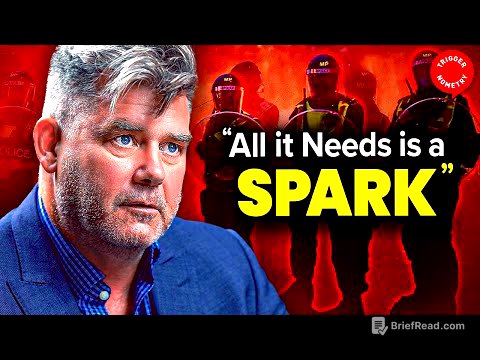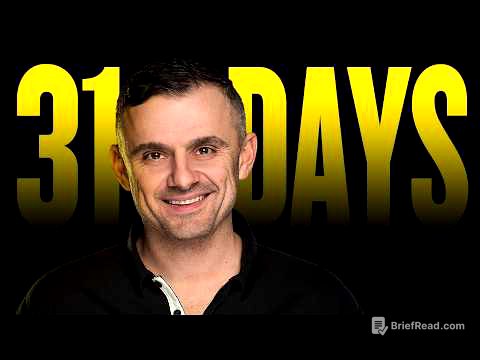TLDR;
This video features a Q&A session at St. Nectarios Orthodox Church, addressing various theological questions and practical issues related to Orthodox Christian living. Key topics include navigating disagreements on sensitive issues with love and truth, understanding free will versus predestination, dealing with anger, engaging with people of different faiths, the importance of practical faith over theoretical knowledge, exorcism, and the nature of Christ. The discussion emphasizes maintaining faith, hope, and love, and focusing on personal sanctification.
- Navigating disagreements with love and truth.
- Understanding free will versus predestination.
- Importance of practical faith over theoretical knowledge.
- The nature of Christ.
Navigating Disagreements with Love and Truth [0:00]
When dealing with family members who hold differing views, especially on sensitive topics, it's important to be compassionate and loving while firmly upholding the truth. One should act as an apologist, acknowledging the other person's struggles but standing firm in one's faith. Even if disagreements lead to strained relationships, unconditional love and openness to dialogue should remain.
Guidance on Errant Priests and Apostasy [0:50]
In times of apostasy, it's crucial to address unwise advice from priests with respect and privacy. If a priest promotes agendas contrary to scripture, one should respectfully disagree, citing scriptural basis for disagreement. The speaker references St. Paul's teachings on the body as a temple of the Holy Spirit and warns against conforming the church to modern views that contradict scripture.
Free Will vs. Foreknowledge: The Case of Judas [5:54]
The discussion addresses the question of Judas's free will in betraying Jesus, clarifying that God's foreknowledge does not negate individual free will. Judas, like all the apostles, had the potential for good but chose to betray Jesus through his own volition. God foresaw this but did not predestine it. Free will is essential to being created in God's image, distinguishing humans from animals.
Living in Deceptive Times [13:04]
The speaker compares current times to those of early Christians, noting that while physical persecution may be less prevalent, deception is more sophisticated due to technology. It's more tricky to be decieved and enslaved today.
Managing Anger and Conflict Resolution [14:13]
The first step of fighting our anger is by keeping it inside. Anger is a legitimate energy of the soul when fighting sin, but should be controlled in personal relationships. It's better to address conflicts calmly after a cooling-off period, expressing hurt feelings peacefully. Anger is appropriate when defending against sin or protecting others.
Engaging with Protestants and Defending Orthodox Beliefs [18:00]
When interacting with people of other faiths, especially Protestants, it's more effective to demonstrate joy and positive change rather than engaging in combative debates. Invite them to church and wait until they question their faith. Focus on personal sanctification and embodying the peace and love of Christ.
The Impact of Early Influences and Finding Faith Later in Life [22:17]
Early exposure to chanting, holy images, and devout figures can deeply impact one's spiritual formation. The speaker shares personal experiences of backsliding after moving to America due to a lack of catechism. Finding a zealous priest at age 30 led to a renewed commitment to the faith and further mentorship from holy figures in Greece.
Practical Faith vs. Theoretical Knowledge [25:58]
Practicing simple virtues and obedience is more important than theological knowledge. Monasteries prioritize humility and practical tasks over theological studies initially. Purifying the heart through simple actions allows for a deeper understanding of theology, which is a gift of the Holy Spirit.
Doctrine vs. Dogma and Accepting Difficult Concepts [29:49]
When encountering difficult or incomprehensible passages in scripture or religious texts, it's acceptable to set them aside without rejecting the whole. Maintain faith in the church and be patient, trusting that understanding will come in time. The Orthodox Church's continuous production of saints is evidence of its truth.
The Orthodox Stance on Exorcism [33:42]
Exorcism is a real practice within the Orthodox Church, though it may be downplayed due to secular pressures. The ability to perform exorcisms is a gift of the Holy Spirit, requiring fasting and spiritual strength. The speaker differentiates between the secularized church and those who uphold the consensus of the fathers.
Evaluating Online Religious Figures [38:43]
When evaluating online religious figures, it's important to be discerning and focus on those within one's own faith, especially during catechism. Be cautious of figures who may mix truth with heresy. It's better to focus on solidifying one's faith through established sources before exploring outside voices.
Dealing with Intentional Sin and Despair [42:03]
The most dangerous sin is despondency. Continue to seek God's forgiveness through confession, even for recurring sins. Perseverance and zeal will eventually lead to God's grace and deliverance. Never despair, and always maintain hope in God's mercy.
The Nature of Christ: Fully God and Fully Man [46:40]
Christ experienced the full essence of God while also experiencing human limitations, except for sin. The Divinity and Humanity of Christ are united, allowing for an exchange of attributes. Christ's actions were voluntary, and his Divinity allowed him to transcend physical laws.









